| |
| |
Photographer,
Location, Date |
Larger images |
Comments |
|
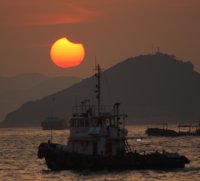
|
Big Mic,
Hong Kong
Jan. 15, 2010 |
#1 |
Photo
details: Canon
450D, ISO 100, 1/160s |
|
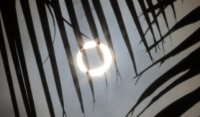
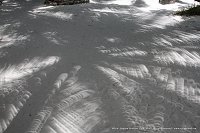
|
Stephan Heinsius,
Ellaidhoo (Maldives)
Jan. 15, 2010 |
#1,
#2, #3,
#4, more |
Annular Solar
Eclipse at 900mm, 650mm and 85mm. Small solar crescents
projected on the sand between the shadows of the palmtrees
during deep second patial phase. Complete report (in German)with
more images can be found here.
I chose the island of Ellaidhoo (Maldives), located only
a few kilometers south of the centerline of the longest
annular solar eclipse of the third millennium to observe
the spectacular event. During 10 minutes and 55 seconds
of annularity some clouds moved into view making it possible
to photograph the eclipse without filter. |
| Click on the image to launch
a movie:
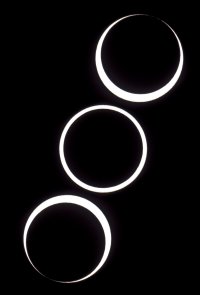
|
Finazzi Antonio,
Menengai Crater, Nakuru, Kenya, Africa
Jan. 15, 2010 |
#1,
#2, #3 |
1-Movie Annular
Solar Eclipse Photo details:movie with 89 photos to release
with Canon
20DA digital camera, Tamron SP 500mm f/8, 200 ISO, 1/1000
exposure, astrosolar filter. 2-Second Contact, Maximum Eclipse
& Third Contact Photo details: Canon 20DA digital camera,
Tamron SP 500mm f/8, 200 ISO, 1/1000 exposure, astrosolar
filter. 3-Eclipse Between Clouds Photo details: Canon 20DA
digital camera, Tamron SP 500mm f/8, 200 ISO, 1/250 exposure,
astrosolar filter. |
|
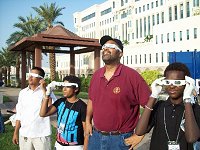
|
Mahed
Abu Zahrah,
Jeddah, Saudi Arabia
Jan. 15, 2010 |
#1,
#2, #3,
#4, more |
Like elsewhere around the globe, a fair number of astronomy enthusiasts including, members of charity societies in Makkah and Jeddah and students, gathered at the International Medical Center Park here Friday morning to catch a safe glimpse of the partial solar eclipse between 7.38 A.M. and 8.45 A.M.
The eclipse is known as an annular eclipse because the moon doesn’t block the sun completely.
The event for the sky-gazers was organized by the Jeddah Astronomy Society (JAC) in conjunction with the King Abdul Aziz City for Science and Technology.
The organizers had made arrangements for a telescope in the park and astronomy buffs were also provided with special tinted glasses to view the celestial event without harming their eyes.
|
|
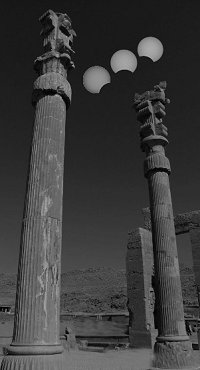
|
Hamidreza
Norouzi,
Shiraz, Fars, Iran
Jan. 15, 2010 |
#1,
more |
jan 15 2010 partial eclipse stages
this is the first seconds/maximum stage and end of of partial eclipse of jan 15 2010 in SHIRAZ ,ancient capital of Iran."takhte jamshid" is one of the most known ancient sites in Iran and hundrede of thousands tourists visit it anually .here ,eclipse stages are captured above two 15 meters height of palace colomns .
|
|
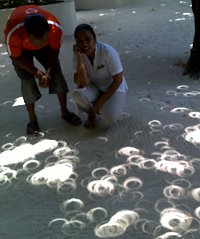
|
Joerg Schoppmeyer,
Conrad Rangali, Maledives
Jan. 15, 2010 |
#1,
#2, more |
This picture shows hundreds of rings under a palm tree during the annularity of the eclipse from 15.01.2010 at the Conrad Rangali, Maledives. The picture is NOT my picture, but it was made by Tony, an employee of the Hotel. He made it with his Mobile-Camera.
|
more
images: from
Vishwanath Hawargi of Uvari, Tamilnad, India; from
Xavier Jubier of Shwe Bo, Myanmar (Burma); from
Shahrin Ahmad of Langkawi, Malaysia; from
Aymen Ibrahem of Bibliotheca Alexandrina, Alexandria, Egypt
|
|